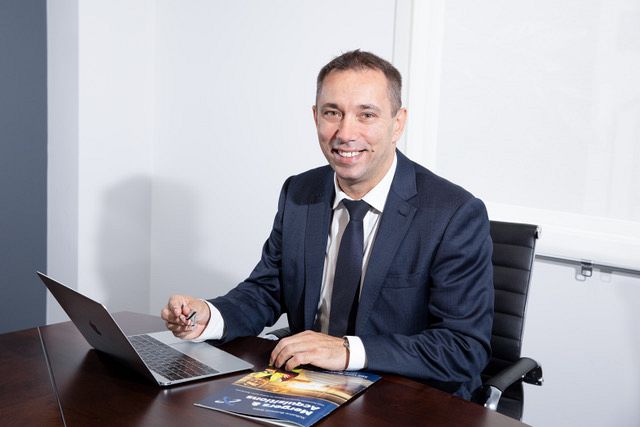Changing the Business Broking Model in 2022

The business broker industry is changing. Zoran Sarabaca from Xcllusive Business Sales recently spoke to us about the future of business broking and his unique approach to the business broker model.
“I got into the industry because I was unemployable you see; I have actually never worked for anybody else myself. I used to have an electrical maintenance company I had to sell, and I ended up selling it myself.” Zoran says of how he got into business broking, a very common story in his words.
Through his experience selling his own company, Zoran recognised a flaw in the business broking agency model and decided he wanted to build a business broking enterprise and Xcllusive Business Sales was established in 2004.
Starting in an office in Sydney, Xcllusive has expanded to regional NSW, and Melbourne and now has offices in Brisbane, Adelaide and Canberra as well.
The Typical Agency
“When I started the company, I never wanted to just work as a business broker, I always wanted a business broking company. That is a challenge. What happens now in business broking, is that it’s an agency model which is based on the real estate agency model which works in real estate, but it doesn’t in business broking for a few reasons.”

“Real estate sales are very geographically specific. You can specialise in one street if you wanted to but in business broking, first there are not as many businesses as there are houses, and they’re also scattered all over the place. So, you can’t have a tight geographical location that you’re gonna specialise in.”
Of course, business brokers can specialise in certain verticals as Zoran says, such as the health, mail, and import-export industries to name a few.
“What I noticed that is lacking with a lot of these agencies, is the fact that they are run as the agency model. Which means if you come and work with them, they give you their card and the world is your oyster. So, you have to go out there and find the company, then you're gonna sign them up for lack of a better word, and then you have to sell that enterprise.”
Zoran said that one of the problems with this kind of model is that you, as the business broker, have to run your own setup within the confines of the company itself which ultimately encourages individual internal competition, and you miss out on a team dynamic.
“It’s not a really pleasant place to be. It happens in real estate and it’s happening in business broking as well. For example, if I’ve got a lead, I don’t want anybody to know if I’ve got a buyer, well I want to sell to this buyer and I don’t want anybody to know.” Zoran said. In this scenario you are “not getting too much out of the organisation” that you are working with.
With this in mind, Zoran said that upon founding Xcllusive, the team asked themselves “okay, what can we do so that we can eliminate that internal competition?”.
“Engaging people to sell, and selling businesses, are different skills. Engaging people to sell, in real estate you don’t have to worry about it, you engage the house, and the house sells itself. In business broking, you engage the business to sell and then the hard work starts.”
“Getting that deal across the line. It’s not about finding a buyer, when you find somebody who wants to buy you have to overcome all the obstacles, that's where business brokers make money but here's the problem, that's very time-consuming, and sometimes you’re gonna have multiple meetings in each week with the buyer and seller and Friday afternoon something happens you have to rush and drop everything to fix it. That doesn’t give you much time to find new businesses and without finding new businesses you’ve got nothing to sell.”
When business brokers spend more than half of their time looking for opportunities to sell, this means they have even less time to properly research and get the optimal deal.
“With less time to make the deal, the quality of work drops. So, what we’ve done in our organisation is that we’ve actually got full-time people whose job it is to go out there and network, do what they need to do generate interest for our organisation and conduct the regulation for those businesses and engage them.
Once engaged, they pass it on to the business broker. Then the business broker only focuses on selling, they don’t have to worry about when the next deal is going to come from and more importantly, they’ve got the time to actually structure the deal.” Zoran said.
Be a good business broker
Business broking is complex. According to Zoran, a good business broker acknowledges that it is imperative to understand fundamental operations, people's psychology, tax structures, and more.
With having dedicated staff at Xcllusive who handle the task of finding the right places to sell, Zoran said that they were able to attract “really good talent and get really good results”.
“We actually have more supporting staff than the business brokers. The supporting staff then help these business brokers in the back end with not only administration and marketing, but also with regulations and bringing in more opportunities. What we manage to do is generate really good income for the business brokers by the virtue of leaving about 60% of their time to work directly on securing the best deals rather than looking to find new ones so they don’t have to worry about it.”
Zoran believes the future of business broking is not about finding businesses to sell.
“I’m 100% certain that for business brokers to survive going forward, not just to survive but to thrive, the whole industry needs to change to professional advice.”
Zoran said that when he started in business broking, accountants would not recommend utilising business brokers but that now it is common practice. Accountants will say “if you’re thinking about an exit I’ve got a relationship with a business broker, let’s bring them in, let’s see what they’ve got to say in terms of- etc…”.
“It’s not uncommon in our industry that we work with somebody who had a company for 20, 30, 50 years and now they’re exiting, that’s pretty much the largest portion of their net worth. When helping them through processing, it gets very emotional but it’s also very complex, so business brokers need to live up to that expectation.” Zoran said.
Weekly updates on business sales and advice, delivered to your inbox. Sign up to Newsletter
Technology and Broking
“I really believe that technology is going to kill this mass market where you put as many businesses online as you can and just wait for something to sell. The AIBB is doing a great job with courses and education in order to be able to deliver a very specialised type of work which is quite complex.”
Technology is making certain tasks for business brokers a lot easier, finding buyers has become a much lower priority task.
“Once you find the buyer, negotiating this deal and facilitating the sale, getting the deal across the line and overcoming issues as they arise through due diligence and negotiation, it’s a very personal part so I really think the business brokers job shifted because of technology. A little bit more deal-making by the virtue of finding a buyer being a reduced focus.”
“But by no means will technology make a business broker obsolete, never, it was always about emotions and people, it was never [just] about business. A lot of people think that technology will make your job super easy, or it will overrun you. Technology will help with certain data tasks, to make it easier, but the core of deal-making still face-to-face, otherwise there is no deal.” Zoran said. The business brokers that will make good income and bring in good results are the ones that engage with people, according to Zoran. They understand the ‘whole concept’, they are dealmakers that focus and spend their time on the deal.
“The deal will not happen by itself, if you leave a deal alone, it will probably fall apart, so you have to project manage the people [involved] from people within the enterprise to people outside the company, all the way to lawyers and accountants on both sides.”
Zoran compared the process to rowing a boat across the river; “You have all these people in the boat, and they all want to go across the river and they’re running around on the boat, you have to keep it balanced to get them all safely on the other side, that’s what a business brokers role is.”
“Finding a buyer is the easy part and it’s been easy since probably 2010. 2008 was the GFC and prior to that, the market was the local paper and ‘For Sale’ section. In 2008 people stopped enquiring about businesses because they were worried about everything that was happening. You would put your ad in the paper for one weekend and you would pay $300 to $400, and you would have no calls. Repeat it the next week and still have no calls. People stopped advertising and everybody moved online.” Zoran said.
For a few years after 2010, Zoran said that the market was ‘very fragmented’ as so many people were building websites and trying to sell businesses online. The problem of finding buyers has quickly been eliminated thanks to the innovation of these websites.
“You go on one of those websites and buyers will find you. Selling stopped being about finding buyers, but actually getting the deal across the line, that’s why the business brokers really have to improve their skills and improve their knowledge, work on less businesses and focus more on better results with fewer businesses.”
While technology can help to a degree, Zoran says that you really have to be personal and close with all of the people involved in the sale and keep your finger on the pulse, find systems to deal with issues that arise, mechanisms for de-risking certain sides of the transitions, and managing people.
“That's where the creative aspect of deal-making and experience comes into play, that a good business broker will come up with a solution for this not just to suggest, but to also help implement.” Zoran said.
“You’ve got to share information, we put [out] a lot of free resources and that’s where the world is going. If you want to educate yourself, you can go online and find enough information for just about anything from brain surgery to copywriting.”
It’s common for people to feel the need to hide their company practices, likely rooted in that internal competitive commercial model. Zoran said it was ‘silly’ to not share your information and knowledge. Business broking is so complex that explaining your competitive advantage does not mean that someone can copy it. Zoran said that one of the biggest problems on the market right now is when you’re talking to the seller, “where are you going to find the buyer?” They ask.
“Don’t worry about the buyer, buyers are everywhere, it's once we find the buyer how are we gonna get this across the line. I’ll tell you how we’re gonna find the buyer we’re gonna put the listing on Bsale and they’re gonna come and call me, that's the easy part.” Zoran said.
Future of Business Broking
On what to anticipate in the coming months, Zoran says he doesn’t know what will happen with the economy. “No one knows what is going to happen with the economy, interest rates are going up and nobody can stop it.” Though the question is, how will it affect the business broking and selling market?
On a positive note, sales for everybody in the industry in general is going well right now, Zoran remarks. That this was somewhat predicted going out of lockdown. With less people going to market during lockdown.
“When we were in the lockdown a lot of sellers were thinking it was not a good time to put the company on the market, logic tells you that, but because of security and everything else a lot of buyers were looking to buy businesses, but there was nothing on the market. While you had a seller's market there were no sellers on the market, so that was going for about a year, year and a half, and what happened in the last 12 months, all these people that didn’t sell started putting businesses on the market and the buyers are still there.”

If it was a seller’s environment during lockdown, out of lockdown with so many people bringing their retirement sooner, facing job insecurity and more, the trouble now is that it can be hard finding a good deal, as Zoran says:
“There is a lot of distortion and operations in the business, for example some people had a fantastic two years because of covid, they were in such a line of business (let’s say protective equipment) but some people got hammered because they couldn’t see clients, or in the case of hospitality venues, entertainment in general being shut down or severely limited. It's really hard to gauge where the company is; what kind of recovery and what kind of performance they're going to have going forward. That's here to stay in the long run but it will work itself out.”
Having been through recessions, major events such as the GFC and Covid ( and other “hiccups” in Zoran’s words), experience shows that there is normally a six month lag.
“When something happens, everybody freaks out and stops, then they realise the world didn;t end, and there is a boost in sales!”
“When it goes down it opens up and you get this rush of people and to do the deal, it's just a timing issue…when you go back and look at the last 5 years, some years are up some are down, but the average is reached anyway.”
Going forward, Zoran says while he isn’t sure what will happen with the economy, he believes that business broking will see some delays but eventually, the same number of deals (even if clustered around an election for example) will still average out. With the election in May, we’re likely to see another boost in sales and activity soon.
Questions About Business Broking? Considering Selling Or Buying? Get In Touch With The Bsale Team Here and Our Team Will Get Back To You.
Read Current eMagazine
Tags: business broker selling small business 2022
About the author

Caitlin Mary
Journalist
Caitlin has a background in media and communications, studying journalism at University and doing various freelance writing and production work over ...









